 ONFILM April 2009
ONFILM April 2009
Like the rest of us, Waka Attewell has been doing some pondering about the recently announced review of the New Zealand Film Commission. Unlike most, he’s also prepared to share his thoughts…
I can finally feel the ground shifting – at last, a review of the New Zealand Film Commission. It’s a breath of fresh air – if a review is what Culture & Heritage minister Chris Finlayson actually wants? (Don’t you have to have a ‘witch hunt’ and a ‘stoning’ and then an ‘enquiry’ before you have a ‘review’?)
Though you could be forgiven for being a wee bit suspicious of the decision to appoint Peter Jackson – the highest paid director on the planet – as the head of our review. It feels a bit like turning up to the PTA meeting to find Helen Clark is now on the board and she says “just treat me as normal”.
To some it’s a perfect choice, but there’s mutterings in the ranks that it might be a smoke screen?
My heart sinks at the thought of a ‘white wash’ as I dribble down my straight jacket – a single strand of spit hangs like a doubt.
A series of images form, mostly the faces of past ineptitude: I relive the years of international markets and those patronizing, grinning faces during those humiliating script meetings; memories of work diligently submitted to the bureaucratic void only to be told there’s a spelling mistake on page nine of my screenplay (an observation presented as a moment of revelation and insight); those courses they invented to tell us what we already knew that we dutifully attended and then pretended the keynote was insightful, all the while knowing full well the roll call of attendance was what would really make us eligible for the funding that would be eked out – if we supplied the correctly ordered paperwork; then later being told there was now more paperwork but that the escalating compliance requirements “weren’t personal”.
Who can make New Zealand movies? New Zealanders can, just like the Brits can make British films, the Spaniards Spanish films, and so on – you get the idea – it’s called ‘National Cinema’. The inhabitants of Hollywood sometimes try to get in on the act and mostly fail. And while everyone can make Hollywood movies (have you rented lately?), not everyone can be uniquely Inuit or Mäori or Bogan or Italian, with the unique perspective this entails. Hollywood is BIG BUSINESS: its wants and needs are attuned to the success of the ‘Blockbuster’, and its mere presence is capable of swamping a local film industry.
Who knows, this review might just come down to two simple concepts and choices: ‘Blockbuster’ versus ‘National Cinema’. One is the road to wealth and success and celebrity, loitering on red carpets and with leggy blondes. The other is… well… um… an expensive hobby and a rocky road to the poor house. And now you want me to choose? Hold that thought, and I’ll get right back to it.
Hell, I’ve done my fair share of work for the Yank invasion, and loved it – I’ve worked with the likes of Jon Voight, Tyne Daley and Shelley Duvall (to name a few), I’ve hung out in seedy bars with Eddie Albert Jnr and Harry Dean Stanton – and even without the celebrity bonding, the work was both creatively and fiscally rewarding. But let’s be clear about what this sort of work is: it’s ‘service work’ – it serves a larger purpose and that larger purpose is Hollywood and its endless appetite for ‘Blockbuster’ movies that fit into the multiplex system and sell lots of merchandise and popcorn. It’s HUGE business and its got a local franchise that we’ve even given a pet name: Wellywood.
‘National Cinema’, meanwhile, is about here and about us, it’s grounded in the earth – we stand with it and upon it – it’s our stories, who we are and where we’re going.
Beyond that, though, defining ‘National Cinema’ is a tricky business, and I’m certainly not going to – but that’s the beauty of it; hell, it might be about the mist, but then again it might be about a love affair between a colonial solider and a Mäori slave, or a deeply compassionate story about a guy in a crib who shoots up the remote community he lives in.
Thirty years down the track with the NZFC, we still don’t have a real clue about what we were trying to achieve – have we all been pretenders in this? We have tried to fulfill their brief with meaning and yet the voice of ‘National Cinema’ is still as muffled as ever. And maybe it’s just as well – somewhere down in the depths of those murky waters there just may be a magical fish swimming about, avoiding all our efforts to capture it. Chances are that if it were finally hooked and reeled in, the NZFC would convene a seminar to study it, during which it would writhe for the briefest of moments, gasping and staring bug eyed at the curious onlookers before being gutted, filleted, skinned, stuffed and mounted, in order that it could be admired by visitors to the boardroom,
So, a review? How might that work? Maybe Peter Jackson is capable of two miracles? The second would be steering this review to a worthwhile ‘outcome’ – the world-first of a bureaucracy that sticks to and serves the needs of its constituents (i.e. the NZ film community) instead of focusing on its own survival – while the first, of course, was that while we’ve been bitching and pushing each other out of the way and cursing the management of the NZFC, just over there (through the tunnel and through the cutting) – Peter has been busy achieving the apparently impossible. Now, from the distant shores of New Zealand, he controls a large chunk of Hollywood; he is creating and making buckets of money with maybe more output than our entire meat and wool industry; he is a one-man global phenomena.
Which kinda begs the question: why would Peter Jackson bother with sorting out a government department that spends less than his weekly lunch money if there wasn’t something in it for him?
I have to be cautious now, as I suggest that Peter will be totally hopeless for this review job for the simple fact that he’s not attached to our ‘National Cinema’ any more (plus, there might be a slight fiscal conflict of interest here), or I’ll be spending the rest of my life behind the pillar in the pub.
This is a serious time of debate – us ‘grunts’ here on the ground should be sorting this out, us folk on the paepae – but I’ll leave the detail of this part to the pub later, where some will be avoiding me (in case I get hit by lighting) and others will only acknowledge me when I’m standing behind the pillar. “There he is,” they’ll point, “the guy who used hopeless and Peter Jackson in the same sentence.”
The film business is all about being connected and who you know and not rocking the boat – unless you’re totally famous, then rocking the boat becomes an art form. Which brings me to another point: the Government is possibly star struck and just wants to rub shoulders with Peter… “Fix the Film Commission and years of shenanigans” – did they put it like that? Hell no! But hopefully this is about more than a photo op and a chance to feel the star dust. (“Take those brothel creepers off and feel the red carpet,” he says, “there’s nothing in it for me.”)
So why the PR coup, and why this chap from that other place [David Court, the head of Screen Business at the Australian Film, Television & Radio School] to help sort out what most of us local practitioners already know?
Already know…? Well, I’m not going to blurt out the solution right here, am I – that would be too easy – I mean, what about the expense account, the flights between here and there and the endless meetings and drafts of the report and the media conferences where questions are not so much answered as alluded to? Hell no, I’m not going to miss out on any of that… and besides, I have a job to justify… and I’ve seen the odd flick in my time, so that makes me an expert. Hey, where’s my NZFC job? I can start yesterday. The broom sweeps clean.
So what went before us that we can hold up as a trophy? Goodbye Pork Pie – a classic ‘National Cinema’ piece, and I believe it made its money back. Peter’s own Heavenly Creatures. Then there’s Barry Barclay with Ngati and Te Rua and The Feathers of Peace, and Leon Narbey’s Illustrious Energy – important New Zealand films in my reckoning. Box office successes? No… but important? Yes!
These movies will earn their place in history; eventually they’ll be recognised as loud and vibrant voices in our ‘National Cinema’ canon.
And it’s hard not to push a bit of history around the plate while contemplating the notion that ‘National Cinema’ is vital to the wellbeing of a community. I believe it’s a vital and necessary vent – I come from a strong history of navel-gazers and outspoken activists – the big kahuna for me was the late John O’Shea, who was more intent on looking over the fence to the neighbours than heading to lands exotic… The interior of the Ureweras and the rugged coastline of Ngati Porou country was our true backlot, and the stories to be told were important to the holistic health of the nation. In the early days the Film Commission was our baby – but within a few years even John was gradually pushed away from the warmth and light of the fire we’d gathered around to tell stories in order to make room for the staff and managers so they could keep an eye on things and, well, you know how it goes, manage us.
Sorry but I’m making this ‘National Cinema’ sound like a bit of a chore, a worthy task that must be upheld in the most earnest way – that is not my intention.
Look, I might be completely wrong and Peter may want to re-engage with the local biz – and, since we’re obviously incapable of conducting our own review, maybe this Aussie bloke might already have the answer with the two tier financial system they have over there. Their system isn’t perfect but then what is? One tier is sort of a bank and the other isn’t; one heads down the ‘Blockbuster’ road and the other heads down the Rabbit Proof Fence track and the two may met somewhere in the twain. And that’s not to say that a RPF may not become a blockbuster but at least it had a gestation beyond “What will they think in the Midwest?” I mean, “What will they think in Taihape?” is still a valid reason to make a movie.
Though you have to wonder: if the Aussies do have the answer, why did they import the ex-NZFC CEO to fix their industry? – You might find Geoff Murphy behind that darkened pillar with me, but for different reasons. I’m just a beginner when it come to cheap shots – hell, he goes for the major neck wound when suggesting that, if the NZFC mandate was to make money, then we should be producing porn… “Porn makes money!” he barked out at a ‘review’ meeting some time back.
Peter Jackson has a colourful history with the NZFC – he broke the rules and Jim Booth, the Commission’s CEO, went out the door with the little guy and his little movie, which is now a part of our larger film history – RIP Jim. They’re shifting the furniture around the lifeboats again, could be a storm brewing.
Is this review merely a bit of a tidy up with obvious PR in place? Are we going to then have another 30 years of wandering in the wilderness in search of the lost platoon? How about we all put our submissions on the Onfilm website so we can see what everyone else is thinking? What use is secrecy and hidden agenda at time like this?
So when the review has spent their breath and done the final spellcheck, what is Peter going to recommend? That the NZFC gets a massive budget hike while it lowers staff numbers?
A PR coup can sometimes backfire.
(Illustration by Ian Michael David)
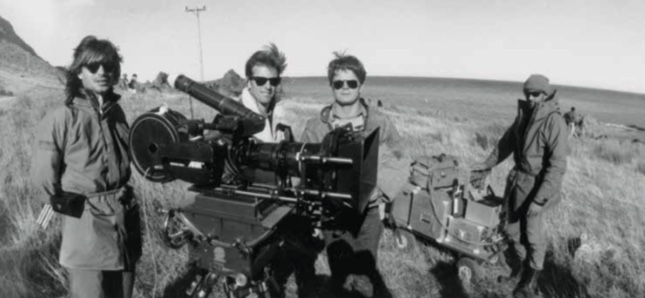
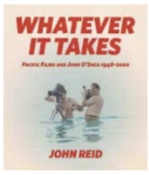
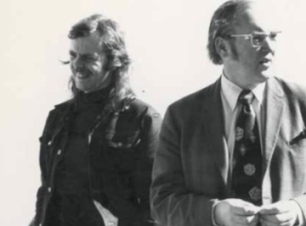
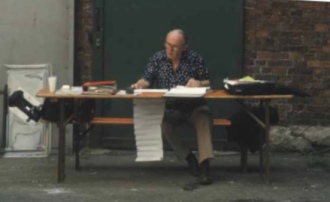
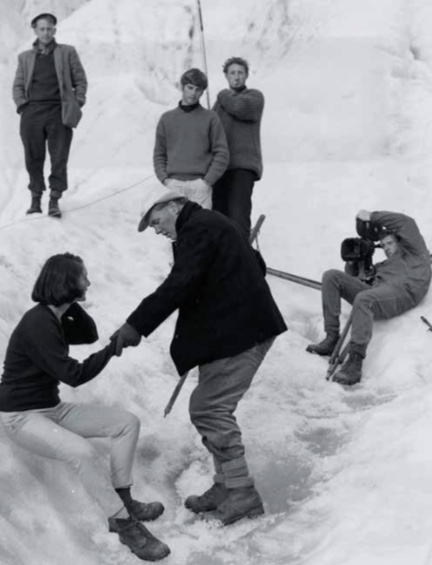


 ONFILM April 2009
ONFILM April 2009
You must be logged in to post a comment.